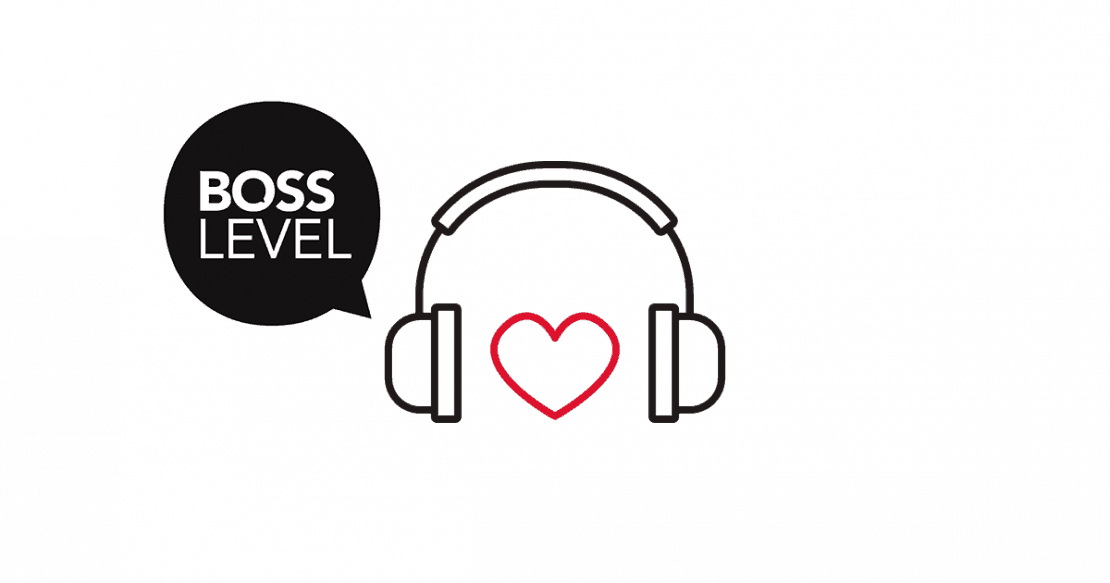19Apr2016
Here we are already in episode three of the second season of Boss Level. If this was an ordinary podcast, I might use a tired cliché such as “time flies when you’re having fun” but this is the Boss Level – the standards are higher. That said, it’s undeniable that Sami and his guest Aaron Dignan, founder of The Ready, had a lot of fun in this episode. Aaron’s company focuses on the intersection of technology, complexity, and humanity, and how all of that connects to the way we work. Here are three ideas from the discussion worth extra thought.
We aren’t comfortable being ourselves at work, and that’s a problem
Can you see that? It’s the mask you don every morning before getting to work that hides parts of your real self. Aaron says that the separation of self from work causes dysfunction, especially as a company grows. Consider that the typical corporate system has a bias against learning and that equals one big mess. Corporations want to eliminate failure, sure, but that mentality can become an excuse to avoid active problem-solving.
Transparency needs to be applied thoughtfully; it’s not magic
Buffer shares the salaries of all their employees – that’s crazy, right? Not anymore, in fact, transparency is a familiar theme and buzzword today. Aaron and Sami go back and forth about whether there’s a limit to transparency, especially when it becomes an onslaught of unnecessary information. The question we need to ask is “Who needs to know what?” And the answer should be grounded in trust. Aaron says transparency and trust must go hand-in-hand to be successful.
Look for the meaning in new things, not just the hype
In the last few minutes of the episode, Sami and Aaron talk about how we’ve become used to the hype that surrounds the newest gadget or widget, and we don’t take a deeper look. We all know the most interesting things that are happening in the world, but we don’t talk about their meaning. Aaron encourages asking “What does this mean?” and discussing it before moving on to the next article or product.
Listen to the episode below or Download the MP3 (29,5 MB):
Timestamps
2:00 Aaron explains how The Ready gets down to business, usually over the course of several months to help transform work environments. The Ready’s clients are large companies, nonprofits, and startups. Aaron says that whether the company is large or growing fast, they face the same kind of complexity.
3:06 Sami asks for Aaron’s origin story, and the keyword to remember is “circuitous.” Aaron went from molecular biology to psychology to brand strategy to disruptive tech consulting to The Ready. The path makes more sense when Aaron says that he fell in love with work design and wanted to help companies tackle their big problems.
5:08 Why is it that when cities get bigger, they become more efficient, and with companies it’s the exact opposite? Sami and Aaron discuss some reasons.
8:04 Aaron starts his definition of complex adaptive systems by explaining the difference between complicatedness and complexity. His example is that a wristwatch is complicated, whereas traffic is complex. Much is unknown/uncontrolled when dealing with complex systems.
9:48 Sami and Aaron discuss how drawing parallels between complex adaptive systems and a company can be very useful. Two big points here are that some things are uncontrollable and that people need to be in smaller groups to work efficiently.
13:15 One complaint against having many smaller groups working within a company is inefficiency. Aaron says it happens, but the tradeoff is worthwhile. Sami and Aaron have a good laugh over the idea that doing things twice is terrible: “If you come up with something once, it’s the perfect solution!” Sami jokes.
15:08 How do Aaron and The Ready start work with a new client? The process changes each time slightly, but the general idea is to start with the leadership, transfer power if necessary, then start implementing small changes and build from there. Aaron says that the dominos start to fall after a company experiences some minor wins. (Sami gives a brief overview at 17:34.)
19:26 Aaron explains the ways he sees technology changing organizations, in a literal sense. (The philosophical conversations can come later, he says.) First, it has improved our ability to move information around, and second, it has changed what we can do in a given amount of time.
21:56 Sami and Aaron talk transparency and business, and how it can both work and fail. They also ponder whether there’s a limit to transparency, and what that limit would be (if it exists.)
24:21 Quote from Aaron: “There’s a big difference between things being accessible and things being put in your face.”
26:20 Should we focus on helping large companies change or helping new companies take over? Aaron says it’s a false choice because problems of growth will plague everyone.
27:51 Quote from Aaron: “…if we go all in on startups, won’t they just become endups over time?”
28:43 To wrap up the episode, Sami and Aaron talk about interests outside of work, how we’re all blasé about whatever’s new, and how the next killer app is one that guarantees your call won’t get dropped.
Links for the episode:
Links for the podcast:
- Facebook: https://www.facebook.com/bosslevelpodcast
- Twitter: https://twitter.com/bosslevelpod
- iTunes: https://itunes.apple.com/fi/podcast/boss-level/id1041885043
- Website: http://www.bosslevelpodcast.com
- Sami Honkonen on Twitter: http://twitter.com/SamiHonkonen
- Sami’s blog: http://www.samihonkonen.com
Links to Nordic Business Forum:


